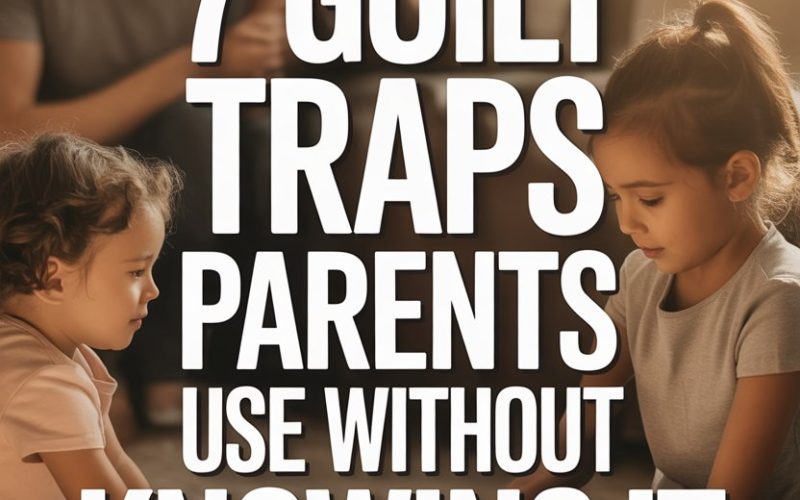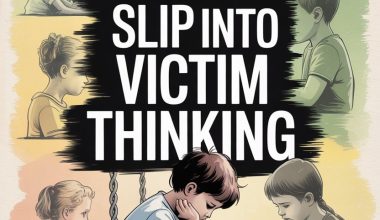Parenting books warn you about the big stuff: tantrums, sleep regressions, the occasional Lego up the nose.
What they don’t mention is how many sneaky ways guilt can creep into your daily parenting—sometimes wielded by you, sometimes picked up from your own parents, and often deployed with the subtlety of a ninja in an Elsa dress.
If you’ve ever caught yourself using a phrase that sounds suspiciously like your own mum, this one’s for you.
Let’s unmask these guilt traps—and swap them for something that works.
1. The Classic “After All I’ve Done for You”
A time-honoured favourite, usually rolled out when a child turns down your lovingly roasted broccoli or dares complain about the Wi-Fi.
It often sounds like: “Is this the thanks I get?” or “I spent all afternoon making this, and you won’t even try it?”
Of course, gratitude matters. But expecting kids to express it on cue (especially when faced with green vegetables) rarely turns out well.
This approach quickly links your acts of care to a debt your kids must repay—by eating, performing better, or just looking cheerful.
The trick here? Shift from expectation to invitation. Try, “I worked hard on dinner tonight. Would you like to tell me what you think, and maybe how I could make it better next time?”
It opens the door for conversation—without the guilt garnish.
2. The Comparison Commiseration
“Why can’t you be more like your sister and finish your chores without a fuss?” Or, “Your cousin never argues about bedtime.”
Comparison might seem motivational, but it often lands as a double whammy: not only are they in trouble, but someone else is the gold standard.
It can seed resentment (toward both you and the person they’re being compared to), and research shows that frequent comparison can dent self-esteem and encourage sibling rivalry (Utah State University).
Instead, try zeroing in on the behaviour, not the person. “I know bedtime is tough sometimes. What would help you wind down better tonight?” Feels less like a high-jump contest, more like teamwork.
3. The “I’m Disappointed in You” Whisper
Nothing chills a child’s spine quite like a parent quietly uttering, “I’m not angry. I’m just disappointed.”
It’s the emotional equivalent of a slow-closing coffin lid.
Disappointment, used frequently, can make kids feel like their value rests on pleasing you.
Over time, they may start hiding mistakes—not exactly the honest communication we’re aiming for.
Swap the guilt for curiosity. “Help me understand what happened. What were you thinking at the time?”
This opens up a chance to build trust and resilience (and possibly to discover that the cat really did knock over the vase, for once).
4. The Guilt-by-Comparison with Your Own Childhood
Cue the dramatic sigh: “When I was your age, I had chores, walked to school in the snow, and ate whatever Mum put in front of me—no complaints.”
Nostalgia tastes sweet, but this guilt trap heaps your own childhood struggles onto your child’s plate, as if their challenges aren’t real unless they match yours from 1987.
It’s tempting, sure, but kids live in a different world, with their own stressors.
Try empathy. “It sounds like maths is really stressful lately. Tell me what’s tricky about it.”
Validating their experience doesn’t erase yours; it simply says you’re listening.
5. The “You’re Hurting My Feelings” Card
Intended as a heartfelt sharing of emotions, but sometimes veers into emotional blackmail territory: “It really hurts me when you don’t want to hug Grandma,” or “You make me so sad when you argue.”
Kids aren’t responsible for managing adult emotions. Sure, you can share feelings—but be careful not to make your child responsible for them.
Research suggests that children who feel over-responsible for their parent’s emotions may develop anxiety or guilt (NIH).
Try a tweak: “I notice you don’t want to hug Grandma. Is there another way you’d like to show her you care?” Respecting boundaries and feelings, while still building social skills.
6. The Martyr Routine
Ever caught yourself saying, “It’s fine, I’ll just do it myself,” with the subtlety of a BAFTA-worthy performance? Or the classic, “Don’t worry about me, I’ll manage”?
Turns out, kids are very good at picking up on cues that they’re letting you down.
When you make sacrifices sound like suffering, they learn (wrongly) that love means self-denial—and that they’re a burden.
Flip the script: “I could use a hand with this. Want to help so we can both finish quicker?” You’ll foster collaboration and model healthy interdependence, rather than self-neglect.
7. The “Think of the Less Fortunate” Guilt Trip
“Eat your peas—there are children starving elsewhere!” This old-school classic is meant to encourage gratitude, but usually just makes dinner even less appealing.
While broadening empathy is noble, guilt isn’t the engine that drives genuine compassion.
Children develop empathy by seeing it in action and participating in acts of kindness—not by feeling bad about what they don’t want for dinner (Harvard School of Education).
Try inviting your child to participate in a charitable activity: “Would you like to help me pick out some tins for the food bank this week?” It’s practical, direct, and skips the side dish of guilt.
Catching Ourselves in the Act
Here’s the truth—every parent lands in one (or more) of these guilt traps from time to time, even the best of us. Especially after a long day, with a to-do list longer than Rapunzel’s hair.
The good news? These habits can be swapped out, bit by bit, for something that moves your family closer to connection and resilience.
You’ll also find your dinner table less likely to feature eyerolls and more likely to feature honest chats (with only a moderate amount of broccoli-related negotiations).
The next time you catch yourself teetering on the edge of guilt, pause and ask: Am I inviting connection, or am I trading in emotional IOUs?
A small shift in words can make a world of difference. And if all else fails—there’s always tomorrow (and possibly takeaway).




